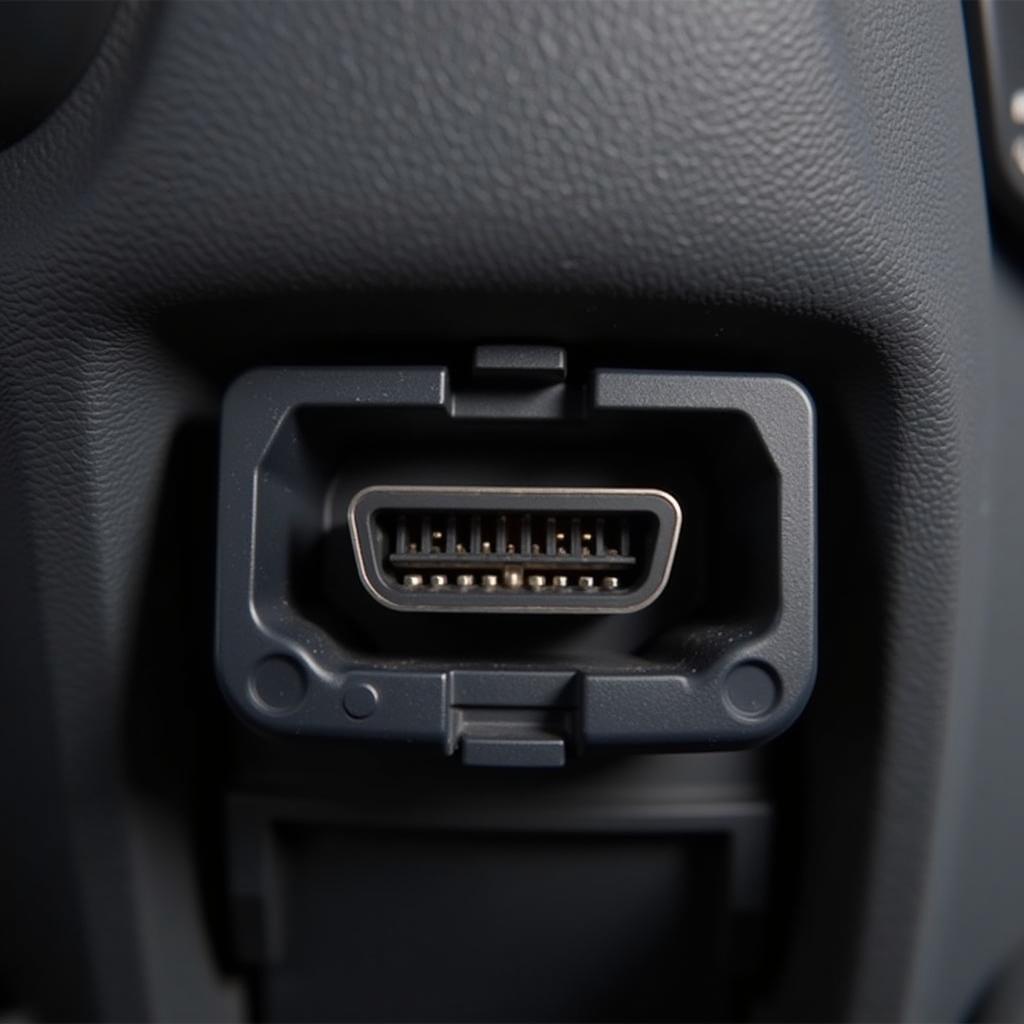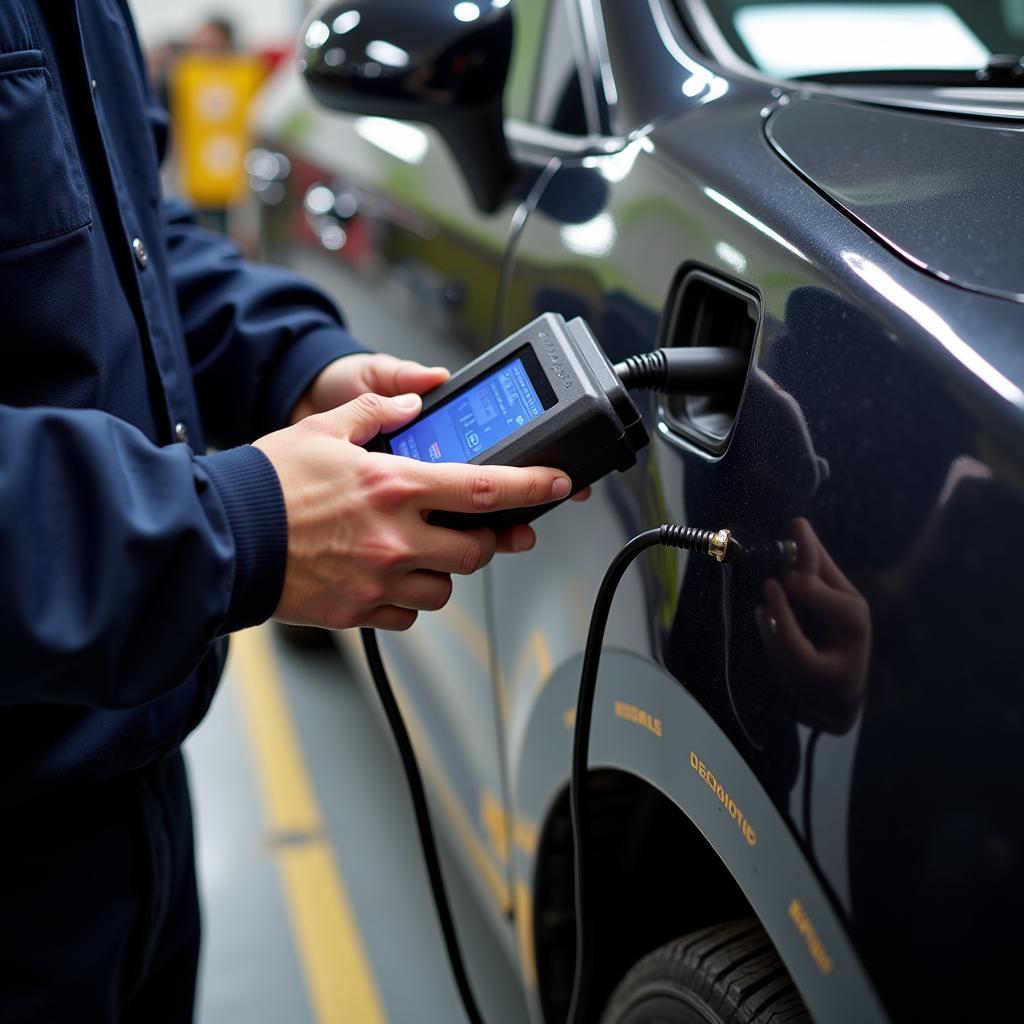Modern vehicles are complex machines with intricate networks of sensors, computers, and electronic components. When a problem arises, pinpointing the cause can seem daunting. This is where car diagnostics come into play. But how do car diagnostics work, and what information can they provide about your vehicle’s health?
Decoding Your Car’s Language: The Role of the OBD-II Port
At the heart of modern car diagnostics lies the OBD-II port, a standardized 16-pin connector typically located under the dashboard on the driver’s side. This port acts as the communication gateway between your vehicle’s computer, also known as the Engine Control Unit (ECU), and a diagnostic scanner.
 OBD-II Port Location
OBD-II Port Location
How Car Diagnostic Scanners Work: Unlocking the Secrets
Diagnostic scanners, ranging from basic code readers to advanced professional tools, connect to the OBD-II port and communicate with the ECU using standardized protocols. When you connect a scanner, it retrieves Diagnostic Trouble Codes (DTCs), which are essentially standardized codes that represent specific malfunctions detected by the vehicle’s sensors.
Think of DTCs as your car’s way of signaling that something isn’t right. Each code corresponds to a particular issue, such as a faulty sensor, a malfunctioning emission control system, or a problem with the engine or transmission.
 Mechanic Using Diagnostic Scanner
Mechanic Using Diagnostic Scanner
Beyond Codes: Delving Deeper with Advanced Diagnostics
While retrieving DTCs is a crucial aspect of car diagnostics, advanced scanners provide much more than just codes. They can access a wealth of live data from various sensors throughout the vehicle, offering insights into:
- Engine Performance: Real-time data on RPM, fuel pressure, air intake, ignition timing, and more.
- Transmission Behavior: Information on gear engagement, shift solenoids, fluid temperature, and pressure.
- Emissions System: Data on oxygen sensor readings, catalytic converter efficiency, and evaporative emissions.
- ABS, Airbags, and Other Systems: Diagnostic information related to safety and other critical systems.
By analyzing this live data, skilled technicians can identify intermittent issues, pinpoint the root cause of complex problems, and perform targeted repairs.
The Benefits of Car Diagnostics: Saving Time and Money
Car diagnostics offer numerous advantages for vehicle owners:
- Early Problem Detection: Identifying issues before they escalate into major repairs, saving you from costly breakdowns and potential safety hazards.
- Accurate Diagnosis: Pinpointing the exact cause of a problem, eliminating guesswork and unnecessary part replacements.
- Cost-Effective Repairs: By targeting the specific issue, diagnostics help ensure that you only pay for necessary repairs.
- Improved Vehicle Performance: Identifying and addressing issues that might be affecting fuel efficiency, performance, or emissions.
- Peace of Mind: Having a comprehensive understanding of your vehicle’s health and being informed about potential problems.
“Regular car diagnostics are essential for maintaining the health and longevity of your vehicle,” says John Smith, a seasoned automotive engineer at DiagFixPro. “They provide invaluable insights that can save you time, money, and potential headaches in the long run.”
DIY vs. Professional Diagnostics: Finding the Right Approach
While basic code readers are readily available for DIY enthusiasts, it’s crucial to understand their limitations. These devices typically only provide generic DTCs without the detailed information and analysis offered by professional-grade scanners.
For in-depth diagnostics and complex issues, seeking the expertise of a qualified mechanic or technician is highly recommended. Their knowledge, experience, and access to advanced tools ensure accurate diagnosis and effective repairs.
Empowering Car Owners Through Knowledge
Understanding How Car Diagnostics Work empowers vehicle owners to make informed decisions about their vehicles’ maintenance and repairs. Whether you’re a DIY enthusiast or prefer to rely on professional expertise, car diagnostics play a vital role in keeping your vehicle running smoothly and safely.
FAQs: Your Car Diagnostic Questions Answered
1. How often should I get my car diagnosed?
It’s generally recommended to have your car diagnosed annually or whenever you experience unusual performance issues, warning lights on the dashboard, or suspect a problem.
2. Can I diagnose my car myself?
While basic code readers are available for DIY use, they have limitations. For complex issues, seeking professional diagnostics is recommended.
3. What is the difference between a code reader and a diagnostic scanner?
Code readers retrieve basic DTCs, while diagnostic scanners provide more in-depth information, including live data and advanced analysis capabilities.
4. How much does a car diagnostic test cost?
The cost of car diagnostics can vary depending on the location, the complexity of the issue, and whether additional repairs are required.
5. Can car diagnostics detect all car problems?
While car diagnostics are highly effective, they might not detect all car problems. Some mechanical issues or problems with specific components might require further inspection.
Looking for the Best Value Diagnostic Tool?
For those who are interested in exploring the world of DIY car diagnostics, DiagFixPro offers a comprehensive guide on what is the best value diagnostic tool for cars. This guide provides valuable insights and recommendations to help you make an informed decision.
Need Help with Your Car Diagnostics?
If you have any further questions or need assistance with your car diagnostics, our team of experts at DiagFixPro is here to help. You can reach us via WhatsApp at +1(641)206-8880 or email us at [email protected]. We are available 24/7 to provide you with the support you need.

Leave a Reply